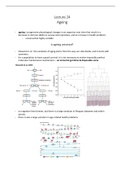Samenvatting
Evolutionary Developmental Biology (AB_1141): Summary of Lectures 24-33 for the 3rd partial exam (VU Amsterdam)
The summary is written in alignment with the course material (the book and the lectures), and it contains all the content necessary to pass the 3rd partial exam (lecture 24-33).
[Meer zien]




